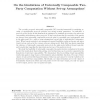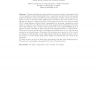24 search results - page 1 / 5 » Information-Theoretic Conditions for Two-Party Secure Functi... |
103
click to vote
EUROCRYPT
2006
Springer
15 years 5 months ago
2006
Springer
The standard security definition of unconditional secure function evaluation, which is based on the ideal/real model paradigm, has the disadvantage of being overly complicated to w...
116
click to vote
ASIACRYPT
2004
Springer
15 years 7 months ago
2004
Springer
Abstract. We present new results in the framework of secure multiparty computation based on homomorphic threshold cryptosystems. We introduce the conditional gate as a special type...
134
click to vote
ASIACRYPT
2005
Springer
15 years 7 months ago
2005
Springer
We propose Gate Evaluation Secret Sharing (GESS) – a new kind of secret sharing, designed for use in secure function evaluation (SFE) with minimal interaction. The resulting simp...
113
click to vote
EUROCRYPT
2003
Springer
15 years 7 months ago
2003
Springer
The recently proposed universally composable (UC) security framework for analyzing security of cryptographic protocols provides very strong security guarantees. In particular, a p...
126
click to vote
TCC
2009
Springer
16 years 2 months ago
2009
Springer
The first and still most popular solution for secure two-party computation relies on Yao's garbled circuits. Unfortunately, Yao's construction provide security only again...


